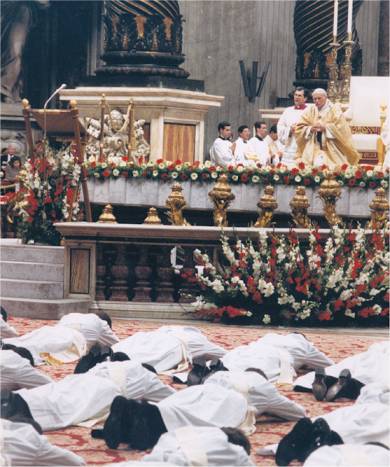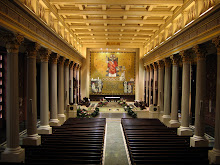My next article for the Catholic Telegraph runs in this weeks issue:
Every Catholic, in virtue of the universal call to holiness, is called to share life with the world. For the majority in the Church, this is accomplished through the vocation to married life. In that vocation, the life and love between a husband and wife can be so powerful and fruitful that nine months later it is given a name! But marriage is not always the easy and glorious life that is portrayed in the movies. I recently asked a group of 250 married couples if their relationship was a ‘snow-globe’ type of relationship: perfect, never a fight, etc. Not one couple raised their hands. They all recognized that they live a life that is tough and requires God’s love for perfection. A successful marriage requires sacrifice, because a spouse gives over something of themselves to their beloved.
The life of a priest is similar, but with some obvious distinctions. Primarily, instead of having a one-to-one relationship with a wife, a priest has a unique relationship with a different type of bride: the Church, the bride of Christ. A priest must also embrace suffering for the one he loves, and through that suffering he gives life to his flock, the people that God has entrusted to his care.
It may sound strange to compare the priesthood to the married life, especially as the priest is celibate. However, I think the comparison is worthwhile, for when we lift up the priesthood, it is not over and against married life; or vice versa. The Sacraments of Vocation, along with the vocations to single and religious life, are all complementary and have unique roles in the life of the Church.
Vatican II weighs in on the benefits of celibacy in the life of a priest: "For (celibacy) is at once a sign of pastoral charity and an incentive to it as well as being in a special way a source of spiritual fruitfulness in the word. (Decree on the Life of Priests 16)" The Council Fathers continue: "by preserving virginity or celibacy for the sake of the kingdom of heaven priests are consecrated in a new and excellent way to Christ. They more readily cling to him with undivided heart and dedicate themselves more freely in him and through him to the service of God and the human family. . . In this way they become better fitted for a broader acceptance of fatherhood in Christ."
This last sentence gets to the heart of the matter. The priest gives life as a father among the body of Christ. He sacrifices having his own unique family for the sake of having a much larger family that he is charged with helping to become strong adult members of the Church. It is no accident, then, that the priest is called ‘Father’ by his community, for the community is his family. A man who is uncomfortable with the thought of being a father to a child will make a terrible priest.
As a priest, although for a only a few short years, I am humbled when I am addressed by the title ‘Father,’ especially when my grandmother insists on it! However, in the life of a parish, I recognize that I have a responsibility for the life and growth of so many souls who looked to me for leadership. This is one of the most powerful, challenging and rewarding aspects of the priestly vocation.
If this is a life that you are feeling called to, or to just learn more about the priesthood here in the Archdiocese of Cincinnati, I invite you to visit the Vocation Office website: www.cincinnativocations.org.
Thursday, March 8, 2007
Subscribe to:
Post Comments (Atom)










4 comments:
Bravo. You ought to consider penning a regular column, perhaps monthly, for the CT.
Rich,
That's the plan. I am on the regular schedule for 'The Catholic Moment' at about every month and a half, or so.
Fr. Kyle,
Great article!! And you get your picture in the paper too!!
Father Kyle: Celibacy by nature leads to a universal love. True! But does marriage do the same? Families seems to have no time except for their own kids, even when the "kids" have left home. Family seems to be "selfish" rather than "expansive" by nature. I was hoping that your article would comment on the "universality" of marriage regarding love. I am a retired priest.
Post a Comment